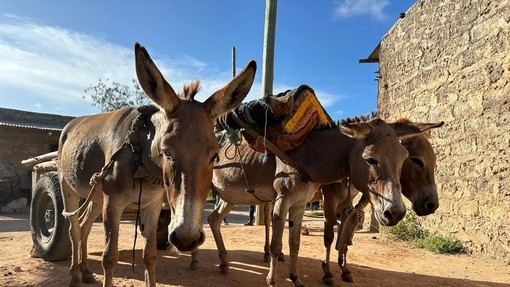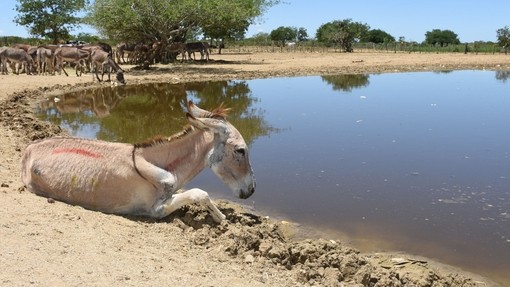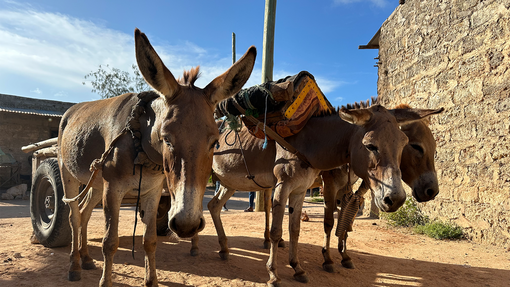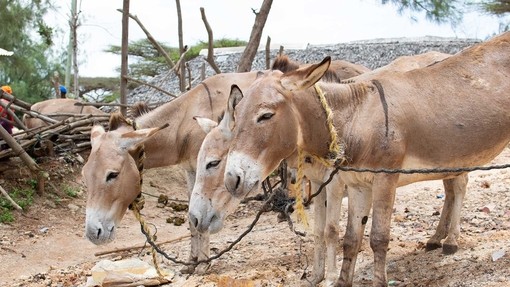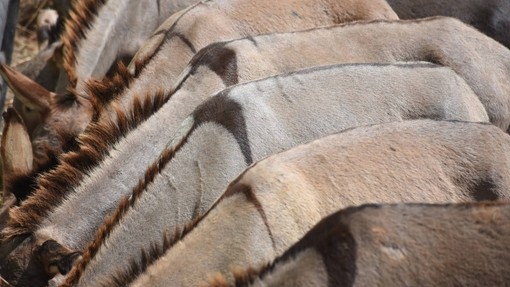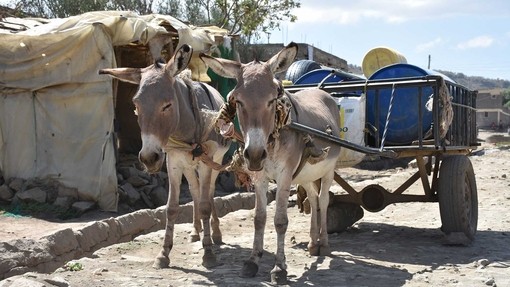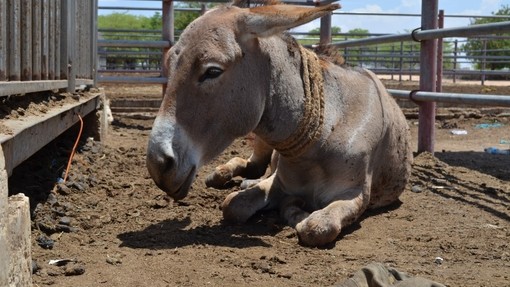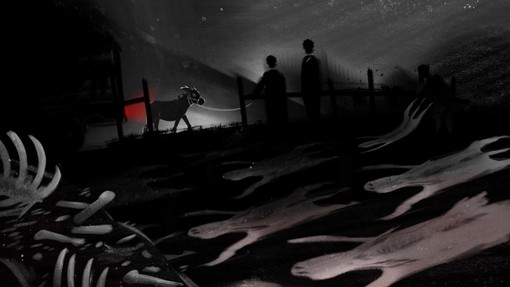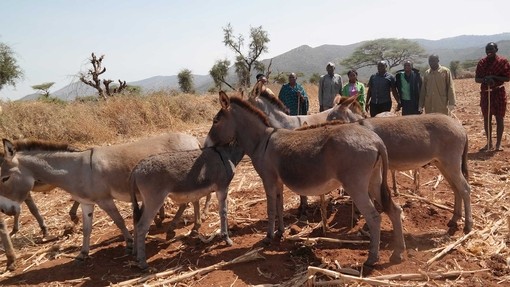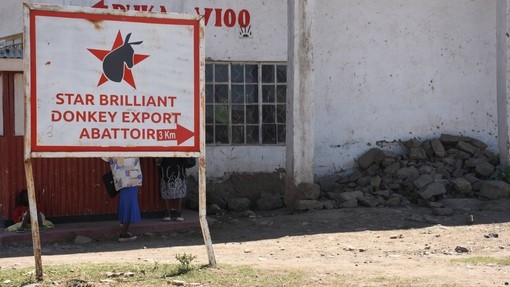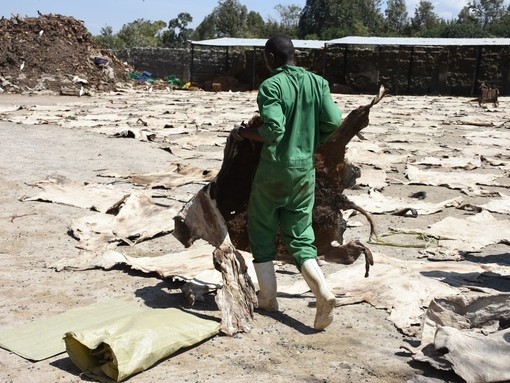
Kenyan Government close slaughterhouses across the country
Cabinet Secretary for Agriculture, Peter Munya issued a directive to close donkey abattoirs within the next month.
Tens of thousands of donkeys are processed in Kenyan abattoirs annually so their skins can be exported as an ingredient for ejiao, a traditional Chinese medicine.
Explaining the decision to the media, CS Munya said: “We want to stop that criminality, and that brutality, restore the donkey to its rightful place in our society - that of supporting livelihoods and providing crucial transport that is not easy to get, especially for the lower echelons of our society.”
Kenya’s support for the donkey skin trade has seen it become the key global hub for supplying China with skins. Kenya has backed the skin trade for a number of years, licencing a total of four donkey slaughterhouses that at full capacity have been slaughtering a total of 1,500 donkeys every day or 547,500 annually.
But the huge numbers of donkeys being slaughtered in Kenya has placed huge pressure on the country’s donkey population, with theft and poaching becoming widespread and donkey-dependent communities expressing fear and alarm at the rate at which donkeys were vanishing.
The Donkey Sanctuary and partners, including Brooke, have been working to bring a halt to the trade.
Mike Baker, Chief Executive of The Donkey Sanctuary said: “This move by the Kenyan Government is game-changing. It not only safeguards a vital livelihood asset for its own people, but stops the slaughter of tens of thousands of donkeys from Kenya’s neighbouring countries that are now being dragged in.
“The Donkey Sanctuary has been working tirelessly for three years in its campaign to get the trade halted and this has been the most significant step so far.
“Countries like Tanzania have only engaged in the trade because they were losing donkeys in numbers into Kenya and felt they couldn’t afford to lose out. They now have no reason to allow donkey slaughterhouses to operate either and we call on them to follow Kenya’s lead.”
“A Bill to prohibit slaughter of donkeys for the trade in Nigeria is also likely to pass in the Senate this week, which will halt the slaughter of 1 million donkeys every year.”
It has been estimated that Kenya’s donkey population has shrunk dramatically as a consequence of the relentless demand for donkey skins.
Investigations by Oxpeckers Investigative Environmental Journalism in 2018 (funded by The Donkey Sanctuary), established that the majority of donkeys being slaughtered in Kenya’s abattoirs were coming from Ethiopia, as there were simply not enough donkeys left in Kenya to meet demand. Since then, investigations have shown that donkeys are now being sourced for slaughter in Kenya from as far afield as South Sudan, Ethiopia, Somalia, and Tanzania.
Simon Pope, Tactical Response Lead at The Donkey Sanctuary said: “I’ve visited these slaughterhouses, and they were crammed full of terrified, broken donkeys awaiting their horrific slaughter. Kenya has defended its position as the main export hub for donkey skins in Africa in the face of increasing evidence that donkey slaughter is unsustainable, that the trade is cruel and often illegal.
“As Kenya’s national donkey herd shrinks from the unregulated offtake, so traders have begun casting their net wider, to more vulnerable rural communities and more recently to neighbouring countries like Ethiopia and Tanzania.
“Kenya’s decision will mean that donkey skin traders will have to substantially reconfigure their operations in Africa, and the likelihood is that they will now target new countries such as Sudan and Chad both of which have been recently assessed as having large donkey populations.
“The Donkey Sanctuary is already anticipating this next move and will be doing everything it can to stop the trade from setting up shop in these countries.”
The charity’s latest report into the trade, Under the Skin Update, has found that local donkey populations have crashed in a number of countries as increasing demand for ejiao has led to an unsustainable number of donkeys being slaughtered.
The supply of donkey skins cannot meet demand in China, which needs around 4.8 million hides per-year for ejiao production, so traders, mainly in Africa, Asia and South America, are exporting additional skins to China.
Donkey populations in China have collapsed by 76% since 1992. Since 2007 donkey populations have declined by 28% in Brazil, by 37% in Botswana and by 53% in Kyrgyzstan.
With just under five million skins needed every year for ejiao production, the industry would need more than half the world’s donkeys over the next five years to meet demand.
The collapse of the donkey population will have a hugely damaging impact on the livelihoods of an estimated 500 million people in some of the world’s poorest communities that the animals support.
Donkeys transport goods to market, carry water and wood, provide access to education and are a vital source of income for vulnerable communities, particularly women.
But the closure of these slaughter houses represents hope for donkey populations and donkey dependent communities across Kenyan and the wider region.
Help stop the slaughter
Donate todayShare this page
Tags
- News

